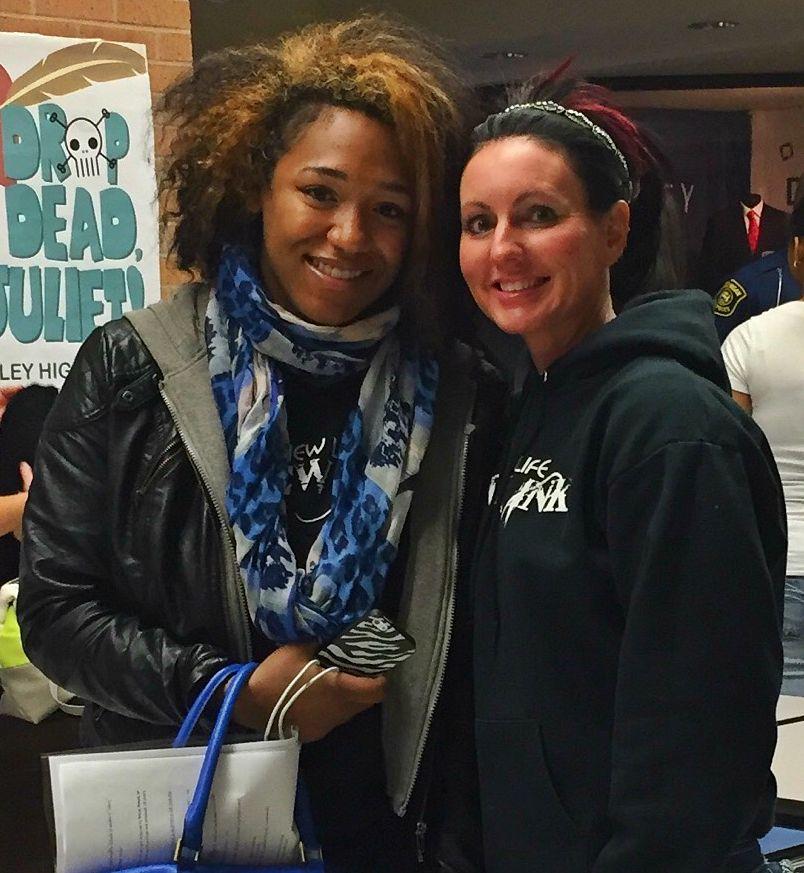Students learn firsthand account of a sex trafficking nightmare
IMAGE / Hunter Johnson
Ms. Jasmine Jones (left) and the Rev. Christina Tipton pose after the Power of 100 meeting Nov. 20. Tipton, a minister who helps victims of sex trafficking, told Jones’ story at the meeting. Jones, a Carman-Ainsworth High School graduate, is a survivor of sex trafficking.
The Power of 100 hosted a discussion Nov. 20 where a few guest speakers told stories and gave facts about sex trafficking.
Ms. Jasmine Jones, 21, was a guest at the meeting who’s story was later told by the Rev. Christina Tipton, a local missionary and strip club minister.
Jasmine Jones, a graduate from Carman-Ainsworth High School, is a survivor of sex trafficking.
Jones went missing in early May 2014 and was found in late June 2014.
She knew a “friend” that suggested a new job to her where Jones would be escorting older men to a dinner and movie to keep them company.
Jones was naïve to think that these men only wanted her for their own company. She was sexually abused, and forced into prostitution.
Tipton said the people who controlled Jones took away her self-esteem and her dignity.
“The violence and the sexual assault kept her from seeing herself as a human being,” Tipton said. “She had seen herself as a commodity.”
That was what made it so hard for Jones to escape the claw’s of her abductors.
Jones’ ordeal began after she visited her cousin in Texas and met a “friend” of her “friend,” who ended up abducting Jones.
Jones was moved around continuously, taken from state to state, so she had no idea where she was.
A pimp escorted Jones everywhere, and she did not see daylight for eight weeks.
Jones believed she was not going to survive. At one point, she said she did not care if she lived or died.
However, Tipton said Jones decided she would fight back.
Tipton said, “Perhaps (Jones) thought they would kill her sooner, by beating her.”
Eventually, Jones’ pimp and customers grew tired of her constant kicking, clawing, and hitting. They thought she was bad for business and they let her go.
Tipton believes that Jones was lucky. She said Jones’ story is unlike many others and is a story that “ends well because she’s alive to tell it.”
Jones is now in sexual abuse counseling and continues to struggle with relieving herself of her pain and finding a way to heal.
But Jones continues to blame herself for being stupid, foolish, and irresponsible.
“This has been the biggest hurdle of her healing,” Tipton said, “accepting what we cannot change and moving along in life.”
Jones is slowly getting back into her regular routine. She manages working a part-time job and attending college.
Federal law defines sex trafficking as a commercial sex act induced by force, fraud, or coercion.
Anyone under the age of 18 persuaded or forced to take part in commercial sex, by federal law, is a victim of sex trafficking.
Ms. Christina Delikta, co-chair of the Michigan Human Trafficking Task Force, said sex traffickers target young people.
“The average age of a child entered into sex trafficking is between the ages of 12 and 14,” Delikta said.
Often traffickers go where large amounts of teenagers hang out and they prey upon vulnerable people.
Trooper Amy Belanger, Michigan State Police, said teenagers who are homeless or runaways are targeted by sex traffickers.
Belanger said that sex traffickers prey on “someone who is in need of a relationship, love.”
Human trafficking is the third largest international crime industry in the world, and the International Labor Organization said it is a $32 billion a year industry.
It is estimated that 100,000 American youth under 18 are trafficked in the sex trade each year, according to the National Center for Missing and Exploited Children.
Sex trafficking exists through online escort services, residential brothels, in the public, on city streets, and at truck stops, strip clubs, hotels, and motels.
Unfortunately, sex trafficking is common.
“People go missing every day,” Delikta said.
It can happen to anyone, and many victims do not even know it is happening to them until it is too late.
But people can help reduce the number of sex trafficking victims by not being afraid to speak out. People who suspect that someone is involved in sex trafficking need to report their suspicions to authorities.
Delikta mentions that some signs to look for are people with unexplained absences from school, maybe they do not control their own earnings, or they work too many hours with little pay or none at all.
Signs of drug addiction; poor physical health, bruises, or physical trauma; withdrawn behavior; depression or fear are other signs to watch for.
These are all signs to take notice of, although this does not necessarily mean that the person is involved in sex trafficking, they could just have a bad past or have made poor decisions.
Tipton said that it is important for people to take notice of these signs instead of ignoring them.
She said, “Anyone who has any questions or concerns, call the Hotline at 1-888-373-7888.”

Class: Senior
Extracurricular Activities: Melody Makers
Hobbies/Interests: Writing, singing, reading, volleyball
Plans after High School: Going...






